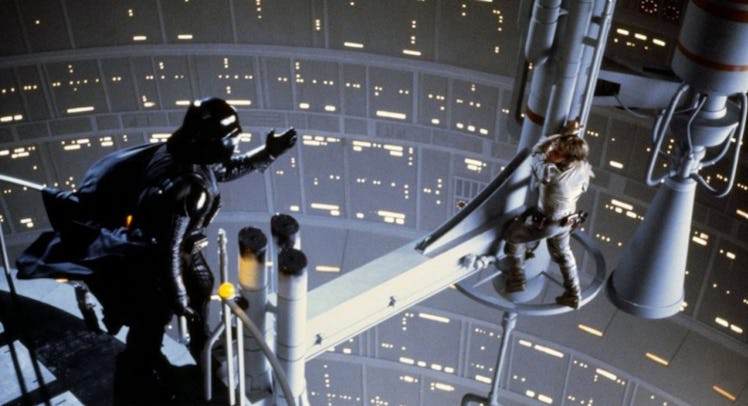Dads Love ‘Star Wars’ But ‘Star Wars’ Will Never Love Dads
The dads in 'Star Wars' will never get better. Structurally speaking, they pretty much can't.

In a galaxy far, far away where Star Wars takes place, fathers abandon their kids or try to murder them, surrogate fathers lie to their protégés, and the German word for father inspires fear in the hearts of all right-thinking rebels. There’s an irony in this because dads are a core Star Wars demographic—research shows the typical @starwars Twitter follower is a 46-year-old married male with children—but there’s also an inevitability. George Lucas’s approach to storytelling and the worldbuilding it entailed guaranteed from the get-go that Star Wars dads would suck forever.
Anyone who knows the difference between a Padawan and a Master also knows that George Lucas was inspired to write Episode IV by Joseph Campbell’s The Hero with a Thousand Faces, a 1949 treatise on structures of myths and how archetypal heroes are born. Campbell insisted that every hero’s journey could be broken into three parts consisting of 17 steps overall. One step is dedicated to solely to dads: “Atonement with the Father.” In that chapter, Campbell argues that a hero must confront the ultimate power in their life: dad.
He’s back? (Credit: Lucasfilm)
“The problem of the hero going to meet the father is to open his soul beyond terror to such a degree that he will be ripe to understand how the sickening and insane tragedies of this vast and ruthless cosmos are completely validated in the majesty of Being,” writes Campbell. “The hero transcends life with its peculiar blind spot and for a moment rises to a glimpse of the source. He beholds the face of the father, understands — and the two are atoned.”
Characters with father figures have it just as bad. Protégé characters like Luke and Rey witness their father figures (Obi-Wan Kenobi and Han Solo) being brutally murdered. Anakin Skywalker kills his own father figure, Emperor Palpatine, after fighting his own son. The whole thing seems like a mess, but it isn’t. Lucas is working off of Campbell’s blueprint. The archetypal hero structure doesn’t allow for dad to tag along on the hero’s journey. Dad is an obstacle to be overcome.
The cross-cultural nature of Campbell’s work and Star Wars’ appeal indicates that the anti-dad elements of popular myths resonate on an almost species-wide level. Does that mean that dads are, on a conscious or subconscious level, always considered villainous? Probably not. The more credible conclusion is that the popular idea of heroism is based on triumph over adverse conditions and against institutional powers. The idea of the hero is so strongly coupled with the idea of the self that the idea of generational consistency undermines the idea of earned glory. Put a different way, Luke wouldn’t get a movie franchise if Anakin was present and attentive on Tatooine.
One wonders how Han Solo screwed up. Presumably by not giving Kylo Ren enough encouragement or showing up late to pick him up from Jedi class.
When The Last Jedi hits theaters this December, we’ll most likely find out who is Rey’s father and why he had to leave during her adolescence. Then, as soon as they’re reunited, he’ll probably die horrifically while she watches or try to kill her. And don’t get up in arms about that being a spoiler. Bad dads and dead dads are a fundamental part of the Star Wars universe.
Want a good dad? Go find a Trekkie.